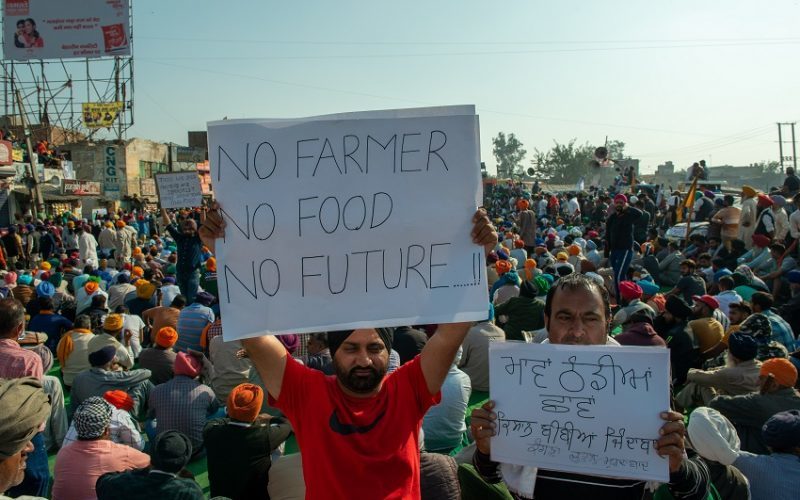Written by : Srijan Das
Photo : shutterstock.com
The central government had released model farming acts in 2017. The Standing Committee on Agriculture (2018-19), however, noted that a number of the reforms suggested in the model acts had not been implemented by the states. In particular, the Committee found that the laws that regulated Indian agricultural markets were not being implemented fairly and honestly or serving their purpose. Centralization was thought to be reducing competition and (accordingly) participation, with undue commissions, market fees, and monopoly of associations damaging the agricultural sector. A committee consisting of seven chief ministers was set up in July 2019 to discuss implementation. Accordingly, the centre promulgated three ordinances in the first week of June 2020.
Let us discuss first the Farmers’ Produce Trade and Commerce Bill which is also known as the APMC [Agriculture Produce Market Committee] Bill. Prior to the 2020 legislation, agricultural trade in India could only be conducted in APMC market yards (mandis). This Act, however, allows trading in “outside trade areas” such as farm gates, factory premises, warehouses, silos, and cold storages and prohibits state governments from levying any market fee or cess on farmers, traders, and electronic-trading platforms for trading the produce of farmers in such areas. The Act seeks to facilitate lucrative prices for farmers through competitive alternative trading channels in order to promote barrier-free inter-state and intra-state trade of agriculture goods. It also permits the electronic trading of farmers’ produce in the specified trade area, facilitating direct and online buying & selling of such produce through electronic devices and internet. Prior to the Act, state governments levied taxes for agricultural produce that was bought outside the designated APMC mandi; this Act prohibits this and creates incentive for buyers to purchase produce outside the regulated APMC mandi.
The government is saying that they have brought this bill to liberate the farmers from the clutches of the APMC so that the farmers can sell their produce to anybody outside the APMC for a better deal and thus improve their income. They also claim that these laws will incorporate a huge boost of corporate investment. They will pay much larger price than the regulated ones thereby ultimately benefiting the farmers. Apart from that, this direct contact between retail sellers and farmers will significantly lessen the problem of several middlemen. But nonetheless questions are continuing to arise over government’s decisions.
First of all, if the corporate is paying more than Minimum Support Prices (MSP), then why don’t the government guarantee the MSP? Regulating the MSP will no way hamper the process laid out in the bill. Rather not wanting to guarantee MSP clarifies their intention – they don’t even want to pay the minimum price also, let alone extra one. Secondly, National Sample Survey Office (NSSO) data from a 2012–13 “situation assessment survey” of farmers reveals that most households in India sell off their crops through private traders or input dealers, rather than mandis or cooperatives. From 2006, there is no APMC law at Bihar. But in contrast to government’s belief, there is no corporate funding or the corporate manufactured infrastructure in the agrarian trade sector. There was never any APMC in Kerala but they fix the MSP of 18 food grains and cereals which repealed corporate away. Third one is Maharashtra. When Devendra Fadnav is was the chief minister, he experimentally employed some parts of this new bill. He fixed some thousand square metres for APMC and left the rest of places for free trading. Surprisingly enough, after five years survey results are showing most of the trades have been happened in that specified area of APMC. The purpose of this bill was that it will bring large numbers of private markets, corporations will invest – open up private markets and there will be competition. But that is not the case at all. This law actually immensely benefits foreign and domestic corporates to reap super-profits, imposing misery both on the farmers and the people. MSP is bound to be abolished. The Indian corporate sector doesn’t at all relish the idea of any competition. When it gets public assets from the government, it wants those neatly wrapped and delivered at their doorstep.
Farmers Suicide in India – A Continuum of Neo-Liberal Policies and Remedies : Part -1
Along with this, the government passed The Farmers (Empowerment and Protection) Agreement on Price Assurance and Farm Services Act, 2020 which creates a national framework for contract farming through an agreement between a farmer and a buyer before the production or rearing of any farm produce. The Government asserts that the Act helps protect farmers engaging with agribusiness farms, processors, wholesalers’ exporters, or large retailers for farm services and sale of future farming produce by a mutually-agreed lucrative price framework in a fair and transparent manner through a contract. The Act provided for a 3-level dispute settlement mechanism by the conciliation board, Sub-Divisional Magistrate, and Appellate Authority. The agreement had to provide for a conciliation board as well as a conciliation process for settlement of disputes.
The Act was met with wide criticism from farmers all over the country (particularly Punjab and Haryana) mainly under the argument that, without any regulation, farmers interests will be overlooked. Since the Appellate Authority was the highest level of appeal for the farmer against any private entity, the farmer is effectively prevented from moving to the court. Thus, the opposition parties claim that the act is highly skewed in favour of private entities as the individual farmers did not have the resources that private companies had. The proposals for ‘Land-pooling’ and legalising the contract system to agribusiness will completely destroy traditional farming. These new laws alsopose dangerous authoritarian threats to our democracy. On the 19th section of APMC act and 13th and 15th section of Contractual Farming act states that “No suit, prosecution or other legal proceedings shall lie against the Central Government or the State Government, or any officer of the Central Government or the State Government or any other person in respect of anything which is in good faith done or intended to be done under this Act or of any rules or orders made thereunder.” There is no clear description in the bill about what ‘good faith’ is. This law clearly takes away the right to approach judiciary. This continuing trend will not only affect farmers but also have a huge impact on every citizen of our country.
The third and final part of the reform – Amendments to The Essential Commodities Act (ECA). Rationing system of food materials was started in India during the time of second world war. ECA was enacted in 1955, and has since been used by the Government to regulate the production, supply, and distribution of a whole host of commodities that it declares ‘essential’ in order to make them available to consumers at fair prices. The government tried to tackle the problem of Insufficient production and excessive hoarding of food grains by strengthening the rationing system with the help of this ECA. This had a phenomenal importance specially to states like west Bengal, where the refugees dwelled in a large number. Increase in production from the end of 60’s helped the ration system to flourish and ‘National Food Security Act’ in 2013, which states “Food security means availability of sufficient foodgrains to meet the domestic demand as well as access, at the individual level, to adequate quantities of food at affordable prices.” made a paradigm shift to the whole system. In this context, on May 2020, Finance Minister Nirmala Sitharaman suggested that the Act will be amended and stock limit will be imposed only under exceptional circumstances such as famine or other calamities. There will be no stock limit for processors and supply chain owners based on their capacity and for exporters based on the export demand. It would also end some punitive measures. The Ordinance states that government regulation of stocks will be based on rising prices, and can only be imposed if there is a 100% increase in retail price (in the case of horticultural produce) and a 50% increase in retail price (in the case of non-perishable agricultural food items).This amendment completely nullifies the measures taken by previous governments to eradicate the problem of excessive hoarding and the result of this draconian policy is already evident in the recent price rise of daily commodities like oil or rice. This new amendment also denies the proactive measures for the benefit of farmers as stated in the 3rd schedule of 2013 act. These changes, especially in a pandemic situation, make a serious threat to the question of food security in India, which is currently at 94th position among 107 countries in world hunger index.
So, the agrarian crisis can be summarised in five words: Corporate is hijacking Indian agriculture. And this is done by aggressive commercialisation of rural India which results in the biggest eviction in the history of our country. 2011 census indicates that over 15 million have left farming, migrate to cities. Those people were, what census says, Main Cultivator. Next moment we can see a huge rise in peons. In Andhra Pradesh only, 1.3 million farmers have left cultivation resulting in a 3 million rise in number of peons. Not only farmers, many with related occupations- weavers, potters, carpenters have lost their job and get absorbed as a labourer of unorganised sector. They don’t enjoy any protection from labour laws- no fixed hour of work, no insurance, even no proper place of living.
What we are seeing is not an isolated event, it’s an ideological progression, which lies at the very core of neoliberal economy. It was there from 1991 onwards with various bumps; if it hasn’t come this far yet, it’s because of resistance from the farmers. But the pandemic situation presented an opportunity to the government. It’s astonishing that despite the pandemic, that despite the fears of infection, despite that, lakhs of farmers have been coming on the streets on one issue or the other, not just MSP. The price of milk was one issue, MSP is another, farm debt is going to be another. I think we are going to see very, very major discontent explored in the farming community. In the days to come, their fight will fix the political and social direction of India.
Ministry of Agriculture & Farmers Welfare press release
(The views expressed in this article are the author’s own and do not necessarily reflect Multidimension’s editorial stance.)
About the author :
Srijan Das : Student, Indian Statistical Institute, Kolkata




